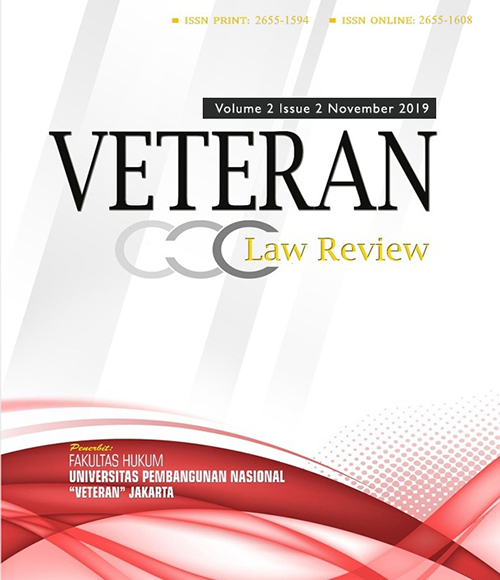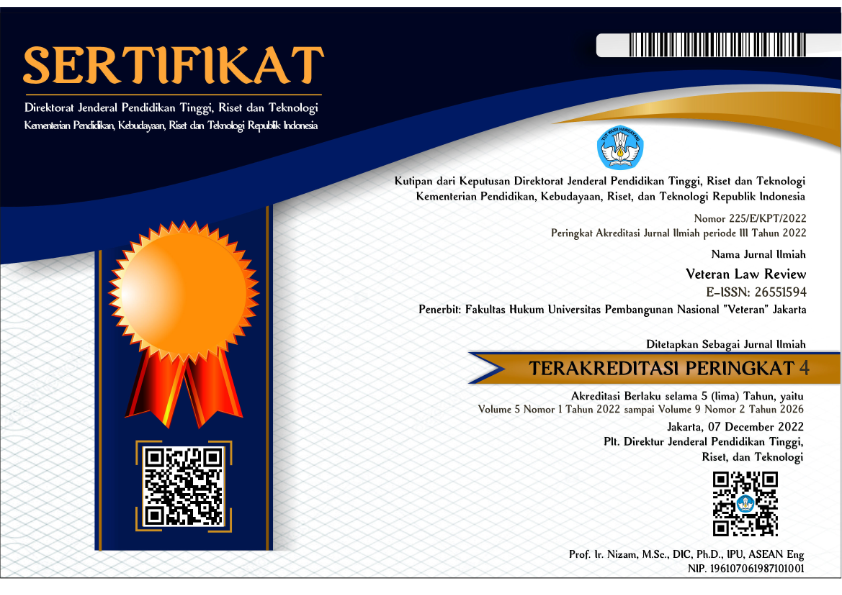Business Actors’ Responsibility Towards Consumers Due To Defective Product
DOI:
https://doi.org/10.35586/velrev.v2i2.753Abstract
This study aims to examine the form of business actor’s responsibilities to consumers in terms of defective products, following up on efforts that can be taken if there are business actors who do not fulfill their responsibilities. The research method in normative and empirical legal research, and the type of research is a comprehensive analytical study of primary legal materials, secondary legal materials and tertiary legal materials. Using empirical legal research approach methods, the approarch is the statutory approach and the fact approach. The focus of normative legal research is an inventory of written positive law mainly concerning the regulation of the rsponsibilities of business actors in buying and selling in the perspective of the Consumer Protection Law No.8 of 1999, the Civil Code (KUHP), and regulations concerning defective products. Research is a descriptive study using qualitative. Determination of subjects in this study using Simple Random Sampling technique. Empirical legal research, targeting aspects of justice, usefulness, and legal certainty based on the Sociological Jurisprudence flow. Research results: Business actors are responsible if the product dects that occur are entirely wrong. The effort taken of the business actor does not want to be responsible for the occurrence of product defects in the sale and purchase transaction is by solving the Dispute Resolution and familial approach. If it doesn’t work, then it can be reached through a court.
Keywords: defective products, business actors, protection, regulations.
Downloads
References
Adrian Sutendi. (2008). Tanggung Jawab Produk Dalam Hukum Perlindungan Konsumen. Bogor: Ghalia Indonesia.
Ahmad Ali. (2002). Menguak Tabir Hukum (suatu Kajian Filosofis dan sosiologis. Jakarta: Gunung Agung.
Anna Gerbrandy. (2018). Doing Good Together: Competition Law and the Political Legitimacy of Interfirm Cooperation.
Borg and Gall. (1989). Research: An Introduction. Fifth Edition. New York, London: Longman.
Bungin, B. (2008). Metodologi Pengabdian Pada Masyarakat Kualitatif. Jakarta: PT. Rajagrafindo Persada.
Claudya, L. (2018). Perlindungan Hukum kepada Konsumen dalam Perjanjian Pembiayaan Konsumen dengan Perusahaan Finance yang menggunakan Fasilitas Channeling. Jurnal Hukum. Retrieved from hukum.studentjournal.ub.ac.id
Janus, S. (2014). Perlindungan Konsumen Di Indonesia. Bandung: Citra Aditya Bakti.
Katsoulacos, Y. (2016). Competition Law Enforcement in the BRICS and in Developing Countries: Legal and Economic Aspects. https://doi.org/10.1007/978-3-319-30948-4
Kurniawan, B. S., & Martin, D. (2014). Tanggung Jawab Pelaku Usaha Terhadap Pemberian Label Halal Pada Produk Makanan Dan Minuman Perspektif Hukum Perlindungan Konsumen. Jurnal Penelitian Universitas Mataram, 18 (1), 90. Retrieved from ejournal.unram.ac.id
Miru, A., & Yodo, S. (2011). Hukum Perlindungan Konsumen. Jakarta: PT. Rajagrafindo Persada.
Muslih, M. (2013). Negara Hukum Indonesia dalam Perspektif Teori Hukum Gustav Radbruch. Legalitas Edisi Juni 2013, TV(1), 131.
Putra, S. (2014). Perlindungan Hukum terhadap konsumen dalam Transaksi Jual Beli melalui E-Commerce. Jurnal Ilmu Hukum, 4(2), 288.
Soeroso. (2006). Pengantar Ilmu Hukum. Jakarta: PT. Rajagrafindo Persada.
Thornton, P. K. (2010). Livestock Production: Recent Trends, Future Prospects. Published 16 August 2010, 2853–2867. https://doi.org/DOI: 10.1098/rstb.2010.0134
Wijaya, G. (2000). Hukum Tentang Perlindungan Konsumen. Jakarta: PT. Gramedia Pustaka Utama.
Downloads
Additional Files
Published
How to Cite
Issue
Section
License
Copyright (c) 2022 Veteran Law Review Journal
Veteran Law Review © 2022 by Faculty of Law Universitas Pembangunan Nasional "Veteran" Jakarta is licensed under Creative Commons Attribution 4.0 International

1. License
The non-commercial use of the article will be governed by the Creative Commons Attribution license as currently displayed on Creative Commons Attribution 4.0 International.
2. Author(s)' Warranties
The author warrants that the article is original, written by the stated author(s), has not been published before, contains no unlawful statements, does not infringe the rights of others, is subject to copyright that is vested exclusively in the author, and free of any third party rights, and that any necessary written permissions to quote from other sources have been obtained by the author(s).
3. User/Public Rights
VELREV's spirit is to disseminate articles published are as free as possible. Under the Creative Commons Attribution-ShareAlike 4.0 International License. VELREV permits users to copy, distribute, display, and perform the work for non-commercial purposes only. Users will also need to attribute authors and VELREV to distributing works in the journal and other media of publications.
4. Rights of Authors
Authors retain all their rights to the published works, such as (but not limited to) the following rights;
- Reproduce the work
- Prepare derivative works based upon the work
- Distribute copies of the work
- Perform the work publicly
- Display the work publicly
- Copyright and other proprietary rights relating to the article, such as patent rights,
- The right to self-archive the article,
- The right to enter into separate, additional contractual arrangements for the non-exclusive distribution of the article's published version (e.g., post it to an institutional repository or publish it in a book), with an acknowledgement of its initial publication in this journal (Veteran Law Review).
5. Co-Authorship
If the article was jointly prepared by more than one author, any author submitting the manuscript warrants that he/she has been authorized by all co-authors to be agreed on this copyright and license notice (agreement) on their behalf, and agrees to inform his/her co-authors of the terms of this policy. VELREV will not be held liable for anything that may arise due to the author's internal dispute. VELREV will only communicate with the corresponding author.
6. Royalties
Being an open accessed journal and disseminating articles for free under the Creative Commons license term mentioned, author(s) are aware that VELREV entitles the author(s) to no royalties or other fees.
7. Miscellaneous
VELREV will publish the article (or have it published) in the journal if the article’s editorial process is successfully completed. JOSI's editors may modify the article to a style of punctuation, spelling, capitalization, referencing, and usage that deems appropriate. The author acknowledges that the article may be published so that it will be publicly accessible and such access will be free of charge for the readers as mentioned in point 3.


















